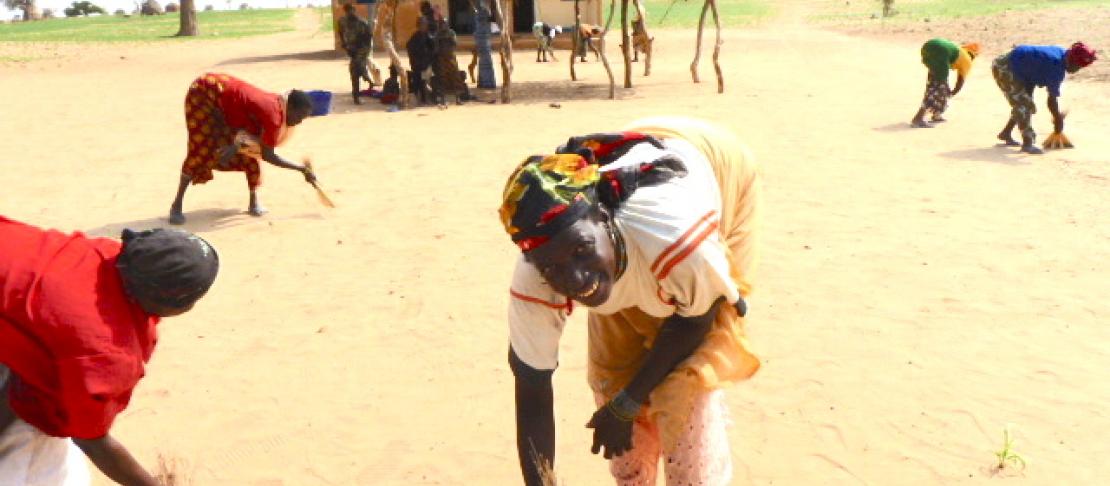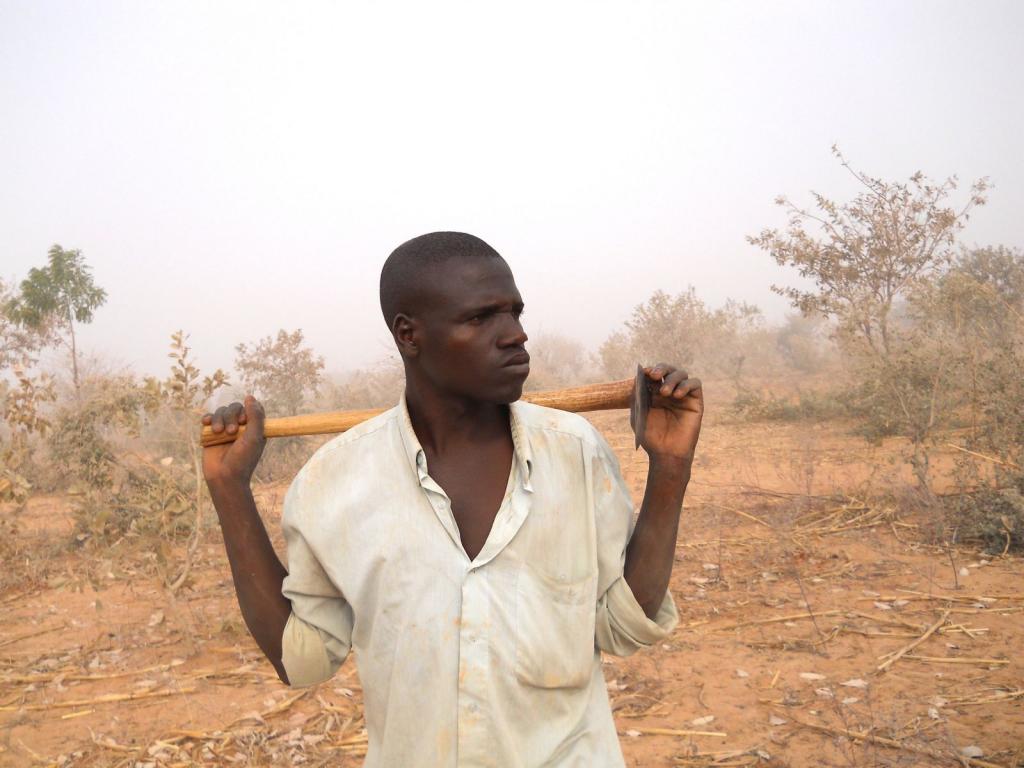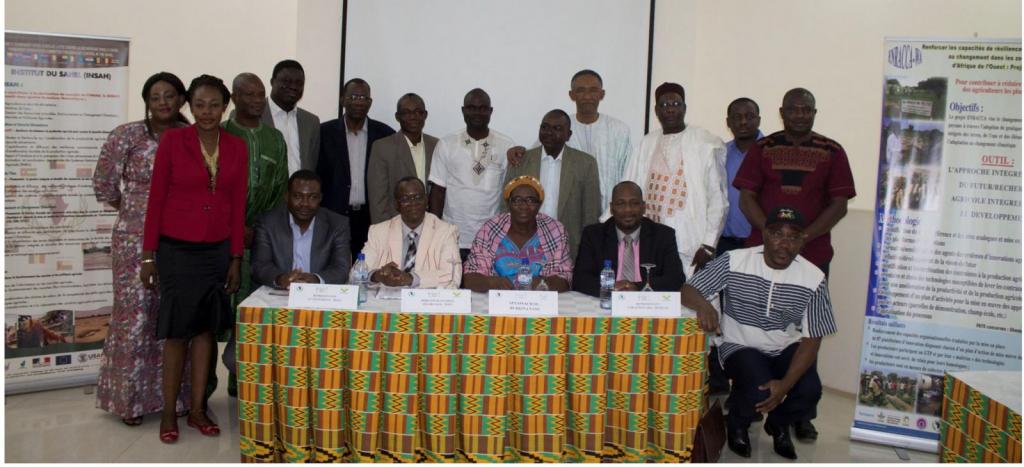Joint efforts are helping vulnerable farmers cope with drought in the Sahel

On the occasion of the World Day to Combat Desertification and Drought, we highlight how the work of CCAFS helps farmers cope with the scourge of drought in the Sahel, particularly in the context of climate change.
According to a Food and Agriculture Organization (FAO) and Organisation for Economic Co-operation and Development (OECD) study 20% of the population in West Africa lives in the semi-arid zone (Sahel) and 5% in the arid zone. These populations are predominantly rural and depend on rain-fed cereal-based agriculture in sub-humid and semi-arid areas, and pastoralism in arid areas. They are highly vulnerable to climate variability and change.
Sub-Saharan Africa and the Sahel in particular, are vulnerable regions in terms of exposure to desertification; declining rainfall, permanent risk of drought which constitute additional burden to an already very worrying situation in rural areas. These have negative impacts on agriculture and thus threatens food security.
Countries like Niger, Mali, Burkina Faso and Senegal have some parts of their territories located in either arid or semi-arid parts of Africa. Consequently, crises are not uncommon due to the fragility of the ecological zone.
The need for implementation of best practices has therefore been proved necessary.
Indeed, the main means of preventing the advance of the desert are the establishment of sustainable agriculture options that protect the soil, good irrigation systems and the preservation of forests.
That’s why there’s a combined investment in capacity building, approaches, practical mechanisms and tools in irrigation infrastructure, investment in the use of drought-tolerant seeds and crops in the CCAFS West Africa intervening areas among others. In Tibtenga (Burkina Faso), Lawra Jirapa (Ghana), Cinzana (Mali), Kaffrine (Senegal) and Fakara (Niger) promoting learning and technical training for farmers on the effects of climate change and proper uses of these technologies have been judged appropriate while supporting beneficiaries to mitigate the effect of climate variability.
What is CCAFS' contribution to the Sahel in the fight against drought?
What is CCAFS 'contribution to the Sahel in the fight against drought?
Desertification and drought are problems of global dimension affecting all regions of the world, particularly in Africa. Those problems require joint actions and efforts by the international community.
The intent of CCAFS and its partners is to boost the ability of farmers to cope with climate change, manage risk and ensure their resiliency.
Soil and Water conservation techniques through innovative projects
In Niger, only around 10% of the land is suitable for farming, as two-thirds of the country is desert.
In Kampa Zarma, Niger, CCAFS will contribute to the realization of coming a project funded by the World Bank: It is initiated by the government of Niger and is part of 3N (Nigeriens Nourish Nigeriens) initiative.
The objective of this project is to increase agricultural productivity and enhance drought resilience of agro-pastoral systems in 60 targeted communities around the country, benefiting 500,000 farmers and agro-pastoralists in 44 communes.

Young farmer from Niger. Photo:P. Savadogo (ICRAF)
In the process of developing the Climate-Smart Village (CSV) model of Kampa Zarma, one can retain technologies tending to rehabilitate the vegetation. A combination of improved agronomic practices and soil/water conservation techniques, agro-forestry practices (land rehabilitation and vegetation, assisted natural regeneration of trees, improvement of fruits) are good techniques that are implemented to prevent the advance of the desert and drought.
Trees hinder the wind that carries the sand, increase the fertility of the soil and contribute to its better humidification. It is therefore necessary to replant trees if there is a risk of drought. This is done thanks to the active involvement of the World Agroforestry Center (ICRAF) in the CSVs work in West Africa.
A successful partnership for semi-arid areas
To avoid soil degradation, joint efforts are also necessary. The project Scaling up climate-smart agriculture technologies and tools to benefits regional, national and community levels end-users is providing support to regional and national partners to catalyse positive change towards CSA, food systems and landscapes, through bringing to scale practices, technologies and institutions that enable adaptation and mitigation goals.
Also, an effective interinstitutional partnership with the Permanent Interstate Committee for Drought Control in the Sahel (CILSS).
CILSS has allowed to scale up the «Farms of the Future approach within the framework of the project "Strengthening the capacity of resilience and adaptation to climate change through integrated land management, Water and nutrients in the semi-arid zones of West Africa" (ENRACCA-WA).
There are regional organizations and institutions working with CCAFS on helping most vulnerables to cope with climate change effects as desertification and drought, such as CILSS, the West and Central African Council for Agricultural Research and Development (WECARD) and the National Agricultural Research Institutes of Ghana/Council for Scientific and Industrial Research (CSIR-SARI), Mali Institute of Rural Economy (IER) , the Senegalese Institute of Agricultural Research (ISRA), Institute of the Environment and Agricultural Research of Burkina Faso (INERA) and the National Institute of Agronomic Research of Niger (INRAN).

Open day for the dissemination of ENRACCA-WA project capitalization documents. Photo: M. A Aziz, Centre Régional AGRHYMET
The ENARCCA-WA project was a contribution of research to strengthening the Capacity of resilience and adaptation of farmers in the semi-arid zones of West Africa . Also, it has placed a strong emphasis on scaling up the best and most promising soil and water management practices and technologies at climate sites in Burkina Faso, Ghana, Mali, Niger and Senegal.
Participants to workshops and beneficiaries have been enthusiastic about the “Farms of the Future” approach and the its climate analogue tool, and requested an implementation manual in the different countries.
These examples show how CCAFS and partners contribute with research and projects to strengthen the resilience of farmers to climate change, including desertification and drought.
Read more
- Video: Strengthening the capacity of resilience and adaptation to climate change through integrated land management, Water and nutrients in the semi-arid zones of West Africa (ENRACCA-WA)
- Project page: Scaling up climate-smart agriculture technologies and tools to benefits regional, national and community levels end-users
- Project page: Building resilient agro-sylvo-pastoral systems in West Africa through participatory action research
- Project page: Developing Climate-Smart Village models in West Africa
Dansira Dembele is communications assistant at CCAFS West Africa based at ICRISAT-Mali regional center.



